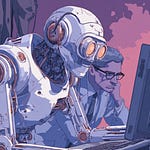In a world facing climate change and clean energy challenges, it’s starting to look like a nuclear energy renaissance is starting to happen. That is, if we can overcome our irrational fear of nuclear. In this episode of Faster, Please! - The Podcast, I talk with Dr. Spencer Weart about the cultural influences that shaped generations of anxiety around nuclear power, and how that tide may be turning.
Weart holds advanced degrees in both Astrophysics and History. For over three decades, he served as Director of the Center for History of Physics at the American Institute of Physics. He is the author of two children’s science books and has written or co-edited seven other books. Among his most recent is The Rise of Nuclear Fear, published in 2012.
In This Episode
A history of radiation (1:05)
The rise of nuclear fear (7:01)
Anti-bomb to anti-nuclear (11:52)
Today’s anti-nuclear voices (20:21)
Changing generational attitudes (24:01)
Nuclear fear in today’s media (28:58)
Below is a lightly edited transcript of our conversation
A history of radiation (1:05)
Pethokoukis: To what extent, when radiation was discovered at the turn of the century—and then, of course, the discovery of nuclear fission—to what extent were we already as a society primed by our cultural history to worry about radiation and nuclear power?
Weart: Totally. Because you say radiation was discovered, presumably you're referring first to the discovery of X-rays and then, shortly after that, the discovery of what they called “atomic radiation,” we now call it “nuclear radiation.” But, of course, before that, there was the very exciting discovery of infrared radiation. And before that, people have always known about radiation: the rays, the heat from the sun; and they've always had a very powerful cultural significance. You think of the halos of rays of light going out from holy figures in Buddhism and Christian iconography, or you think of the ancient Egyptians with the life-giving rays of the sun bestowing life on things because actually, of course, radiation of the sun is life-giving, it does contain a vital life force. So it's not a mistake to think of radiation as some kind of super magical, powerful thing.
And then of course there's also death rays. Death rays actually did become very popular in the literature after the discovery of X-rays because X-rays could, in fact, cause great damage to people, and then so could atomic rays, so, already by the early 20th century there were lots of kids' books and exciting adventure fiction featuring death rays. But you go back before that, there's the evil eye. There's rays radiating out from the evil eye could cause harm. Then there's astrology, the rays from the stars could influence human destiny. So as soon as you mention radiation, there's an enormous complex of things that come out, which was very easily linked to atomic radiation because of all the other characteristics of atomic discoveries.
And yet, certainly in the first half or first third of the 20th century, there was, people saw radiation as having great promise, even to create a Golden Age. Tell me a bit about that.
It came out as soon as radiation was discovered. Whenever there's a new physics discovery, almost the first thing that people think about is medical applications. And that happened with electricity and with X-rays—of course, x-rays do have great medical applications—and nuclear radiation (I'll call it “nuclear,” even though they called it “atomic” back then). Nuclear radiation did turn out to be radon and radium and so forth that Curie discovered did turn out to be useful for curing certain types of skin cancers and so forth.
But people went much beyond that because there was all this magical stuff associated with it. We have to remember that very early on it was discovered that nuclear radiation is the product of the transmutation of elements: uranium and radium and so forth and even other elements.
Like alchemy.
Yeah, transmutation was alchemy. It was immediately recognized that, oh, the nuclear physicists were the new alchemist and they were happy to talk of themselves as that. But of course, as soon as you have something powerful, as I said, the first thing, when you have a new discovery, that you think about is medicine. The second thing you think about 10 seconds later is weapons, so nuclear death rates were very early imagined. And the atomic bomb—the first atomic bomb actually was sort of a device carried by a terrorist in the 1901 novel. And then in 1915, H.G. Wells conceived of the idea of an atomic warfare weapon that civilization destroyed, but then followed by transmutation and of course humans destroy civilization, then we’ll rise again in atomic powered cars. We love utopia powered by nuclear energy. So all these things were there together, the good side and the bad side. On one side you had people saying that this is the 1930s mind. This is before nuclear fission was discovered. This was entirely science fiction.
Would you call that a period of general sort of pro-progress science and technology enthusiasm?
Well, it was, except… this was certainly the case in the 1900s. People thought that radium could cure all ills. Nuclear energy was seen as the elixir of life, talking about the old alchemists and so forth. There were all these wonderful things it could do and by the time it got to the First World War and the Great Depression, people were a little less happy about technology. So in addition to the wonders of atomic power plants and so forth, there were also things like… my favorite is a movie in which Boris Karloff doesn't play the mad scientist’s monster, he plays the mad scientist who discovers a new kind of radium rays, and of course he means to use it for good and he uses it… always using it to irradiate the young women to cure them, because, of course, radiation carries not only life force, but if you dig down deep into the radium side that has this sort of sexual thing. So these 1930s science fiction images of nuclear or mad scientists irradiating young women having a definite violation aspect. In this movie Boris Karloff gets too big a dose of radiation and goes mad and it turns him into a monster and goes around glowing in the dark—maybe the origin of the glowing in the dark idea—and then killing people with the touch of his radioactive hand. So it was all there together, both magical good and magical evil. Very, very strongly mythologized and Freudenized. The writers at the time read their Freud and they were happy to put in all these ideas of bad parents. And the mad scientist is the bad parent out to rape… well, I probably shouldn't go too far with this because… You have to see the pictures to really appreciate how deep this stuff goes.
Would you say that, overall, pre-Hiroshima, that the general public attitude was sort of positive about the potential of radiation and, eventually, atomic fission? Was it overall positive?
Yes, I would say it was generally positive, but with very deep roots. The positivity was mingled, when you go down deep enough, with all sorts of negative or ambiguous things: ideas of mad scientists as sort of the bad parent or the authority figure, the mean, merciless dictator, all of these things and the evil eye death ray kind of thing. They're all there sort of broiling around at a very deep level, a very deep psychological level and a very deep cultural level. And on the surface side, I would say it was generally positive and the overall idea was positive.
The rise of nuclear fear (7:01)
So if those things were sort of bubbling around, was it the atomic bombings of Japan that brought that stuff to a boil? Was that the key moment, or did that happen afterward? Was that the key inflection point?
It came afterwards. When Hiroshima happened, all the commentators from President Truman on down, the feeling was, “Oh, oh, it's actually real!” All the stuff that we thought was things that teenage boys read in their pulp fiction or in horror movies, all this stuff is actually real, so that was a shock.
And so it went two ways. One of course was the actual image of Hiroshima. And then when atomic bombs started to proliferate, when the Russians got the atomic bombs and we worried about them bombing our homes, then all this stuff that was sort of underground and seemed mythological—atomic war and the end of the world, and so forth—all became a scientific reality.
But at the same time, the other side also was coming out very strongly, and this was partly done deliberately. The government—well, the American government, the British government, the French government, the Soviet government—all got very worried about how upset their publics were and how frightened they were by atomic bombs. So they made a very strong effort to promote what they called “Atoms for Peace:” nuclear reactors, nuclear-powered ships, nuclear-powered everything. We use radiation. Radiation has a life force, right? So we'll radiate seeds and we'll get these new kinds of petunias and better crops.
Both of these things came out and there was a strong mixture of positivity and negativity, mostly connected with nuclear war, originally. It originally was connected with atomic explosions. And then this phase ended, this sort of 1950s Atoms for Peace thing ended with the hydrogen bomb, all of a sudden, there was a very big shift.
Is that just because it was just obviously a much more powerful explosive, or was it the Bravo incident which you write about in the book?
Yeah. There's two things going on here. First place is the hydrogen bomb is a thousand times more powerful than an atomic bomb. So this whole business of “duck and cover,” which, I was born in 1942, I did the “duck and cover” in school and so forth, that made sense with an atomic bomb. Okay, oh, the atomic bomb goes off in New York City, I'm in the suburbs, I duck under the desk. In a hydrogen bomb, you're inside the fireball. The whole idea of hiding from it is useless. So there's that one overwhelming thing. And the second thing with hydrogen bombs is that besides burning a city, they produce an enormous amount of fallout. Now, the fallout from the Hiroshima bomb actually didn't do much damage and the atomic bomb tests that people conducted in Nevada, they actually did do damage, but people didn't know it at the time because the atomic authorities were kind of hiding it. The Atomic Energy Commission had what they called—everybody at the time, called it—a “father-knows-best attitude,” which later turned out to be the bad father, the dangerous father.
But with the hydrogen bombs coming along, you couldn't hide the fallout. It was just enormous. If you were a thousand miles away, you had to take shelter from the fallout. And so there was a big rush for a couple of years to build fallout shoulders. And then people realized, “No, what's the use of staying in a fallout shoulder for two weeks, and then when you come out, what are you going to get?” It was at this was point that the positivity got just overwhelmed. Particularly the positivity about radiation got overwhelmed.
Radiation can be useful. Radiation is very medically useful. In fact, medical radiation and use of radioactive isotopes and nuclear rays saves, I don’t know, millions of lives a year. In a single year it saves far more lives than I've ever died from nuclear radiation. But people then were sort of overwhelmed by the idea of nuclear war and of nuclear fallout, and this had a very strong political component.
Anti-bomb to anti-nuclear (11:52)
So tell me about the political component and then tell me how people sort of went from fearing radiation from nuclear war to fearing a nuclear reactor, which is not a bomb.
After the hydrogen bomb an anti-war movement appeared, and it began in Japan, and it began in an interesting way. The first hydrogen bomb test polluted some fishermen who were nearby and they made them very sick and a pool of Marshall Islanders, Pacific Islanders, and made them very sick, and it caused some deaths, and the commission didn't want to admit it. But it also came down in the Pacific and all the tuna in the Pacific, the Japanese got very upset. Tuna to the Japanese is hamburger to Americans. Okay, it's a sacred thing. And the idea that you could hold a Geiger counter to it and there might be radioactivity in it was very frightening. And, of course, the Japanese had a natural worry about atomic warfare in the first place, so a movement began against fallout from nuclear weapons. It was against the testing of nuclear weapons.
What they really didn't want—and this was true as the movement spread entirely around the world—what they mainly didn't want was to be bombed. The actual aim of the anti-nuclear movement, which ended up mobilizing millions and millions of people coming out into the streets, a very major movement, which had a very strong effect on politics and even in the Soviet Union. So what the leaders of the movement decided is they were going to focus on the fallout from bomb tests. The idea was to stop the bomb tests as a way of slowing down the nuclear arms race. If we could stop the tests, at least they won't be making more bombs. That's the first part, because it was a backyard issue. We can tell people the fallout is going into their backyard. My favorite is a kid says, “Oh, my mother says you shouldn't eat snow because there might be a piece of the bomb in it.” Okay, that's what radioactive material is now, it's a piece of the bomb. And so it was very powerful. It's in mother's milk, it's in your children's teeth. So it was a very powerful thing.
And in order to do this, however, there was a certain little scientific difficulty, which is that the radioactivity in fallout, by the time it's thousands of miles away, is extremely low. Now, we do not know the effects of extremely low radiation. If you give a dose of unit one to one person, that person will die. If you give a dose of one millionth of a unit to one million people, will one person die? Well, that can be argued.
And, in fact, the scientific evidence suggests that when you get to very, very low levels, that is, to the levels that are sort of normally in an environment, the levels that you get when you take one flight in the airplane or you go to some places in China where there's natural radioactivity, or if you live inside a brick house, these very low levels of radiation don't seem to be especially harmful. Life evolved for 5 billion years in the presence of low levels of radioactivity. So there's a scientific argument about this, and there's still a scientific uncertainty, but the scientists, feeling very bad about atomic weapons, decided, “We will say that, scientifically, very low levels of radioactivity experienced over millions of people are a bad thing.” And that's been the sort of official view of the anti-nuclear, anti-bomb scientists to this day. And so that became established. That was the point in which radiation, which is, as I said, is something we've lived with for three billion years, was established—this force of nature was established as just definitely an evil thing. It's a piece of the bomb. We don't want to have anything to do with it.
And if it's an evil thing, then whether that radiation is generated for military use, or peaceful use, it's a bad thing, and there's just inherent risk. We cannot control this demon.
It’s the mad scientist’s monster, it's the evil eye, it's the death ray. And, again, there's politics here because after the Cuban Missile Crisis and the tremendous excitement, and Kennedy and Khrushchev said, “We have to do something, our populaces are terrified now. This is very bad for us as leaders of our countries, to have our populace terrified that the things that we as leaders are doing are going to do…” Well it's very simple. We put the bomb test underground. Go on testing the bombs, we don't stop the arms race, we put the bomb test underground, so there's no fault. And the whole anti-nuclear movement just collapsed. They'd made this their issue. They made a good background issue. They say, we're going to stop fault. They did stop fault. So the thing went away. So what happened to these people? Well, meanwhile, atoms for peace was progressing.
Nuclear reactors were beginning to come online, and some of the people who had been anti-atomic bomb began to worry about low level radiation for reactors. It's the same issue. And for reactor issues, this tiny, tiny amount of radioactivity, but that's over millions of people. Well, we've already decided it is a bad thing. And so an anti-nuclear reactor movement began up, and it made, through a very substantial extent, the same arguments about low level radioactivity and the same organizations and the same individuals, in many cases, who’d been agitating against atomic war. I would argue that this may be a case of psychological formation known as “displacement.” You can't deal with something: nuclear war, you deny. We're just going to go into denial about if the bombs are there. We're not going to think about, which is still the case, by the way. We’re still largely in denial of the fact that the president of the United States and the president in the president of Russia, by their sole power, can press a button, so to speak, and can launch nuclear war. Each of these two men—well, I guess it’s also true of Xi now, he seems to be pretty much in power in China—there's three people now who've been launched a nuclear war on their own say-so and launch hundreds and hundreds of missiles essentially destroy civilization. We're all in denial about that, and people have been in denial about that since about 1965.
But if you're locked in a room with a guy with a flame thrower and somebody lights a match, you're going to get upset. And that seems to be what happened with the anti-nuclear reactor movement. And that's now become embedded, for example, the Green Party in Germany began as an anti-bomb party, converted to an anti-reactor party. What they actually are, if you get down to it, is an anti-additional low levels of radiation. When radiation is at a certain level, we don't want to add one percent in any place on earth from any reactor to it, and that's become their DNA, it’s in their DNA. So the Green Party in Germany, it can't escape from their original orientation because of the same anti-bomb…
So we see this transfer from nuclear weapons to nuclear reactors with radiation as sort of the common… But then in the ’70s, it's also then sort of the anti-reactor position then seemed to get mixed up with a broader anti-modernity, anti-industrial society sort of attitude.
Right, but actually this began more in Europe and the Europeans were very big on this, the whole 1960s thing, and really it's a 1960s phenomenon—the Baby Boomer, the 1968 generation, perhaps—that don't like nuclear. There is a feature of nuclear reactors, and this is an inherent feature of nuclear actors, is you need a lot of capital. If you're in a socialist country like the Soviet Union, you still need a lot of capital, it's just going to be under some big organization. In fact, the government always has to be involved, especially when people are worried about the safety of it, and you're going to need government regulations, so you're going to have a big government, you're going to have big corporations, and, because nuclear weapons are involved, you're also going to have secrecy. So, no matter what, you're dealing with these sort of secret, paternalistic authorities, which the kids of 1968 hated the whole idea of paternalistic authorities with their immense powers, and secrets, and God knows what they're up to with their machinations.
Whereas, the original idea was, “Well, solar power is dispersed.” Okay, anybody can put up a solar panel, so that's very communitarian. So that became a very important part of the politics of it. Less so now, I would say.
Today’s anti-nuclear voices (20:21)
Let me ask you about the politics of now because I understand that, and then obviously Three Mile Island was perhaps the capstone event, but yet, today, maybe the attitudes toward nuclear are changing and there's talk of nuclear renaissance, and in Europe—though not Germany—there's a lot of talk about building new reactors, keeping reactors open. Is the anti-nuclear sentiment today… in what ways is it different? Is it more about cost, or nuclear waste? It's not necessarily a fear of sort of “bigness,” we seem to generally like technology in this country.
That was the thing of the ’60s. That's not the thing now. In the United States and Western Europe, cost is a big feature because we can't seem to be able to build these things on time and in budget, but then we can't build a subway or a highway or a railroad on timer and budget, either. So these big projects we're not very good at these days, and that is a problem for the nuclear reactors. So the hope is to build smaller nuclear reactors so we don't run into this giant project syndrome that the United States and Western Europe seem to have problems with. But there's a lot of other things going on here.
Certainly the younger generation doesn't have the same feelings that the older generation did. Nuclear energy for the young folks, it's the symptoms. It's a postmodern thing. The three-eyed fish is not a scary thing. It's kind of a postmodern reference to the stuff that your parents were afraid of. So it's all ironic. The game Fallout, which is enormously important, made a billion dollars of sale (well, four, I think it was a billion dollars of sales in the first 24 hours after it was released) these are big cultural phenomena, so it's the post-apocalyptic wasteland, but it's a reference to the scary post-apocalyptic wasteland. Like I say, we're in denial about the actual. Radioactive mutant monsters? Of course there are radioactive monsters. When I give this lecture, I show a picture of one, he's wearing shades, he’s is kind of cool. It's all ironic and distancing, and so on and so on. The younger generation doesn't have that thing, but they have sort of an automatic response, which has just been built into the culture, an automatic response that, “Oh, there's something bad about radiation, I'm not actually viscerally afraid of it the way my parents were, but I just automatically think it's bad. And I'll give you an important example, okay, I'm going to give a life and death example.
After the Fukushima accident, when the tsunami overcame this thing—the Japanese had done very bad job there—the Japanese evacuate a lot of people from around there. Two thousand people died in the immediate evacuation, mostly the older people were yanked out of their homes or retirement homes or hospitals and so forth. Since then, a lot of the people have not been allowed to go back. They've been displaced. There's a lot of morbidity and mortality among these people whose communities have disrupted. This was totally unnecessary. If they had just left everybody in place and maybe handed out some iodine pills, nobody would have died. The kind of reactions that people have to these things… But that's not the worst mortality from Fukushima, the worst mortality from Fukushima is that the Japanese and the Germans shut down the nuclear power plants and burned coal instead, and the death rate—the deaths from burning the coal instead of the nuclear reactors—is now estimated at about 400,000 people. 400,000 people died from—oh, sorry, I’m off by an order magnitude: 40,000 people. Anyway, many tens of thousands of people have died from coal smoke that didn't have to die if people hadn't panicked.
Changing generational attitudes (24:01)
It is significant. It's research I mentioned in my book, and I've actually had some of the economists who've done some of that research on this podcast, and it's a lesson that the Japanese seem to have learned, whether it's to have less pollution or meet various environmental objectives, they seem to have re-embraced nuclear. Given, perhaps, how younger people today, younger voters maybe don't have that sort of deeper repulsion toward radiation that their parents did. Do you think, one, maybe putting the economics aside, that from a public perceptions standpoint, are you positive or negative about a nuclear renaissance in this country and can any optimism survive any sort of nuclear accident almost no matter how small?
It's going to be difficult because, like I say, the reaction to Fukushima shows that the government reaction and the media reaction shows that there's still an enormous amount of this stuff going on, both in the older people and also just by habit, by automatic response from the younger people. What's the worst power accident that's happened recently? Most people wouldn't realize it was the breaking of hydroelectric dams in Libya. They killed tens of thousands of people. Over 10,000 people died when a hydroelectric dam broke. A hydroelectric dams, that's renewable, that's supposed to be great stuff, right? Nobody talks about that. No nuclear reactor has ever killed 10,000 people, or a thousand people, or a hundred people, even. But hydroelectric dams, this isn't the first time a hydroelectric dam has broken and killed 10,000 people, either. It seems to happen every 20, 30 years or so, but people aren't afraid.
So yes, it's very serious. Nevertheless, there is another thing which is becoming very prominent in many people's minds, and which has, in fact, led to quite a substantial number of environmentalists who were originally opposed to nuclear actors who were saying, “We must have nuclear reactors,” and you know what this is: This is climate change. This, as you may know, is the other thing I've spent 25 years of my life on, is climate change. And so I'm now just going to give you a very brief little homily.
Under the current agreement, Paris Agreement as extended, if all the countries keep their pledges (that's a big “if”), they keep their pledges, some countries may do better than the pledges, but the estimate from the IPCC is that there will warm up to 2.7 degrees Celsius above the pre-industrial. We're now at about 1.4, so that's getting about twice as far as we are now. 2.7 degrees Celsius, in a world at that level, it will be rather difficult to maintain a prosperous and liberal civilization. Right now we have maybe a third of the world lives in a prosperous, liberal, fairly liberal free society. We would like that to be a hundred percent by the year 2100, but if we get up to 2.7 degrees C, which is the trajectory we're on now, then it's going to be extremely difficult to maintain that even for the third of the people who have it now.
But there's another feature which the climate people mostly don't like to talk about. You actually have to read the footnotes in the IPCC report to get this. You have to look at the graphs and get the numbers off the graphs. People, when they say, everybody says 2.7 degrees C, that's what the IPCC says is the most likely outcome, but there are large error bars on that. It could be 4.5 C degrees Celsius. What's the probability of going above 4.5 if you read it off the graphs? Five percent. And I have quotes from two separate very senior climate scientists saying, “Well, you wouldn't get on an airplane if it had a five percent chance of crashing.” This is why people are fighting to keep it down below two degrees. Once we get above two degrees, the probability of the airplane crashing becomes fairly high.
Is the consensus middle path or sort of these more extreme predictions, are they scary enough that environmental groups, which still are anti-nuclear, will change and there'll be a broader environmental pro-nuclear shift?
It definitely has made a difference to some prominent individuals. I'm not going to name names, but they're quite a substantial number of people and increasing numbers of people who are… The scientists are terrified, and the climate scientists are just, they have a hard time sleeping at night, so they worry about their kids. I had experience because I lived for 25 years studying nuclear war and all that stuff, so I guess I have a little thick skin when I think about the climate, but it's even scarier than nuclear war, simple fact of the matter, because nuclear war was a question of, can we avoid it? But climate change is something we're on track for now. That's where we're actually heading.
Nuclear fear in today’s media (28:58)
Let me finish up with this question, since you talk so much in the book about culture and the images that we sort of feed to ourselves. So I can think of two, perhaps, relevant bits of media over the past few years. I was wondering if you've seen either and if you had any general thoughts. One was the fine Chernobyl miniseries, which may have been on HBO, it was a four-part series on Chernobyl. And the film Oppenheimer. Have you seen either, and maybe give some context on how you look at those?
I'm not going to comment on Oppenheimer, that's very complicated. Chernobyl, they did a wonderful job of reproducing the Soviet thing. Everybody was smoking all the time. I was in the Soviet Union, you know? I'll just give you one example. They showed a helicopter going over and they showed it crashing. And the implication there is, “Oh, somehow magical radiation from the reactor crashed the helicopter.” Well, there actually was a helicopter crash, and it crashed because it ran into a crane. So that's just dishonest. That's just dishonest. And unfortunately, this is the way that the media is still, to a substantial extent, treating radiation.
There came a point in that miniseries, which, overall, I thought was excellent, when you finally found out what the actual death toll was, I think many viewers were surprised because if you watched every one of those episodes where they were talking about just how dangerous this meltdown was and the potential deaths, if the reactors exploded, you would've thought that many, many tens of thousands or a hundred thousand people had died—and they didn't! It was almost anti-climactic to find out how few people actually died. And if this is the first you had ever heard of Chernobyl, I think it was probably fairly surprising to people.
People die all the time in coal mine accidents. I have no idea what the death toll is. It's terrible. But coal is familiar, okay, as one of the people said in 1946 when they were talking about reactors, “Well, it wasn't 10,000 tons of coal they dropped on Hiroshima.” We have these associations with nuclear things that we just don't have with traditional things. And the associations, as we've discussed, go very far back into death rays, mad scientists, bad fathers, sexual implications of things, all kinds of magical and mysterious things that get associated with nuclear energy that they've never been associated with the more traditional forms of energy production.












